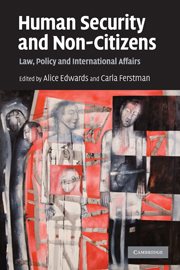Book contents
- Frontmatter
- Contents
- About the editors
- About the contributors
- Preface
- Acknowledgements
- Part I Human security, human rights and human dignity
- Part II Physical and legal security, armed conflict and refuge
- Part III Migration, development and environment
- 7 Empowering migrants: human security, human rights and policy
- 8 Labour migration management and the rights of migrant workers
- 9 Socio-economic rights, human security and survival migrants: Whose rights? Whose security?
- 10 An insecure climate for human security? Climate-induced displacement and international law
- 11 Human security and trafficking of human beings: the myth and the reality
- Part IV National security and the ‘war on terror’
- Index
7 - Empowering migrants: human security, human rights and policy
Published online by Cambridge University Press: 17 February 2011
- Frontmatter
- Contents
- About the editors
- About the contributors
- Preface
- Acknowledgements
- Part I Human security, human rights and human dignity
- Part II Physical and legal security, armed conflict and refuge
- Part III Migration, development and environment
- 7 Empowering migrants: human security, human rights and policy
- 8 Labour migration management and the rights of migrant workers
- 9 Socio-economic rights, human security and survival migrants: Whose rights? Whose security?
- 10 An insecure climate for human security? Climate-induced displacement and international law
- 11 Human security and trafficking of human beings: the myth and the reality
- Part IV National security and the ‘war on terror’
- Index
Summary
Introduction
It is seemingly every day that our attention is captured by media reports portraying the situation of migrants, or as these reports will often label them, ‘illegal immigrants’, ‘economic migrants’ or ‘aliens’. Frequently harrowing, such stories, from all around the world, typically depict migrants setting out in search of new opportunities in leaky boats or airless lorries, prey to traffickers and corrupt border officials; working long hours in cramped, unsanitary factories; languishing in arbitrary detention for years on end; or confronting racism, violence and xenophobia in host communities. In the twenty-first century, migrants have become the human face of the feared and vilified ‘other’ accused of importing not just themselves, but also disease, crime and societal breakdown into countries of transit and destination. The migratory journey, once imbued with images of heroism and entrepreneurship, is now seen as a journey borne out of desperation or self-indulgence, embarked upon not by adventurers and heroes but by criminals and scroungers. Former United Nations Secretary-General Kofi Annan noted that: ‘The public has been fed images of a flood of unwelcome entrants, and of threats to their societies and identities. In the process, immigrants have sometimes been stigmatised, vilified, even dehumanised.’ He called this ‘a silent human rights crisis that shames our world’.
At the same time, the subject of migration now tops the political agenda in domestic politics around the world, in inter-governmental deliberations, and in discussions at the United Nations. Over the last few years, international debate on migration has increased dramatically.
- Type
- Chapter
- Information
- Human Security and Non-CitizensLaw, Policy and International Affairs, pp. 227 - 272Publisher: Cambridge University PressPrint publication year: 2010
- 4
- Cited by



